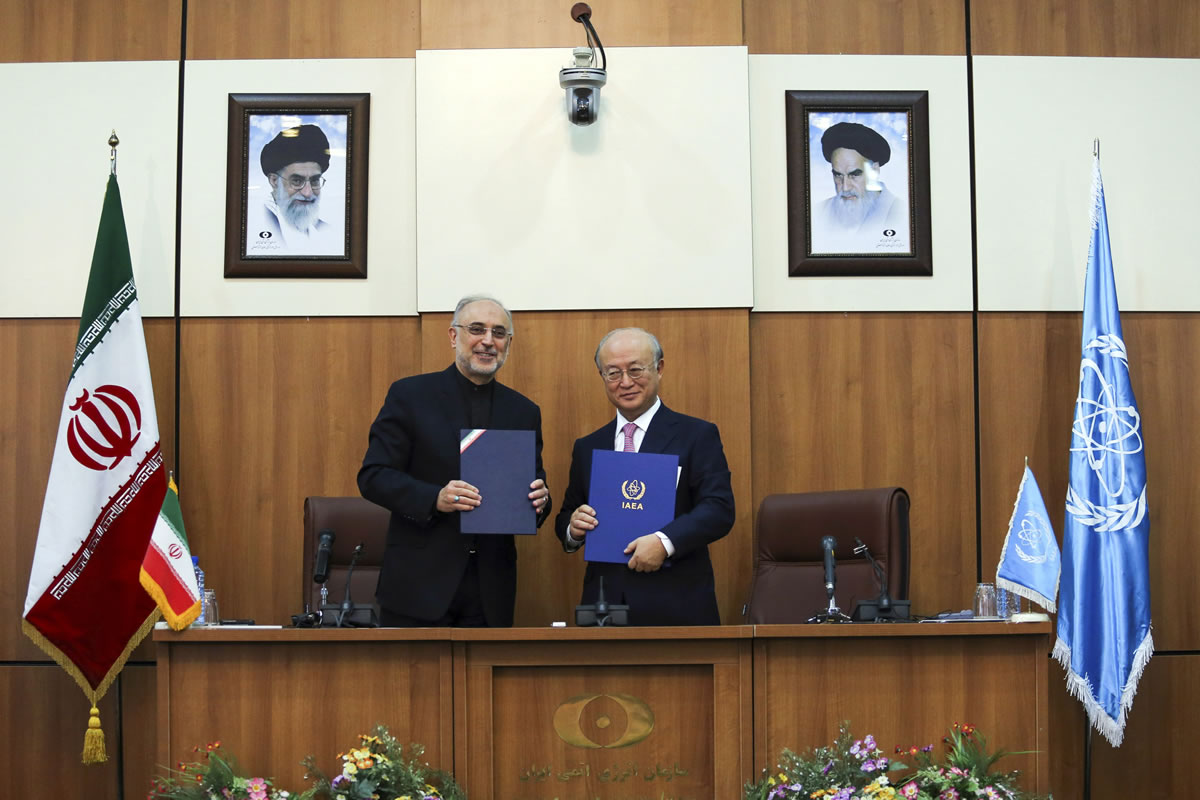DUBAI, United Arab Emirates — Iran agreed Monday to offer more information and expanded access to U.N. nuclear inspectors — including more openings at a planned reactor and uranium site — even as America’s top diplomat said Iranian envoys had backed away from a wider deal seeking to ease Western concerns that Tehran could one day develop atomic weapons.
The flurry of announcements and comments showed both the complexities and urgency in trying to move ahead on an accord between Iran and world powers after overtime talks in Geneva failed to produce a deal that could curb Iran’s uranium enrichment in exchange for a rollback in some U.S.-led economic sanctions.
With negotiators set to resume next week, Iranian officials promoted the pact reached with the U.N. nuclear chief Yukiya Amano as a “roadmap” for greater cooperation and transparency, which could move the talks ahead. But the plans do not mention some of the sites most sought by U.N. teams to probe suspicions of nuclear-related work, notably the Parchin military facility outside Tehran.
“It’s an important step forward, but by no means the end of the process,” Amano told The Associated Press in Tehran. “There is still much work to be done.”
Western leaders, meanwhile, were keen to display a unified front after suggestions that France had broken ranks in Geneva and demanded more concessions from Iran on enrichment levels and an under-construction heavy water reactor that produced a greater amount of plutonium byproduct, which could be used in eventual weapons production. U.S. Secretary of State John Kerry said it was Iran that put the brakes on reaching a first-phase agreement, but gave no details on the Iranian concerns and suggested it was only a matter of time before a formula is found.
“There was unity but Iran couldn’t take it,” Kerry said during a stop in Abu Dhabi. He added: “The French signed off on it, we signed off on it.”
British Foreign Secretary William Hague said the world powers presented a united front to Iran at the weekend talks that failed to reach an accord, and although “some gaps” remained between parties at the talks, “most of those gaps are narrow.”
In Jerusalem, Israeli Prime Minister Benjamin Netanyahu has acknowledged that an overall deal is likely between Iran and world powers, which would undercut Israeli threats to launch military action against Iranian nuclear sites. Yet he hailed the delay as a chance to “achieve a much better deal.”
“The target date for this deal is the date on which a good deal will be achieved that will deny Iran a military nuclear capability,” he told Israel’s parliament Monday.
For Netanyahu and his backers, however, hopes have all but evaporated that Iran can be forced by negotiators to completely end its ability to make nuclear fuel. It’s now unclear what type of deal would satisfy Israel, which sees a nuclear-armed Iran as a threat to its existence.
Iran has categorically denied it seeks nuclear arms and insists its only seeks reactors for energy and medical applications. Iranian officials portrayed the expanded U.N. access as further sign it seeks to work with the West.
Under the plans, announced at a joint news conference, Iran would allow inspectors a first-time visit of its key Gachin uranium mine on the Gulf coast and give broader access to the heavy water facility being built in the central city of Arak. Heavy water reactors use a different type of coolant to produce a greater amount of plutonium byproduct than conventional reactors. Inspectors from the U.N.’s International Atomic Energy Agency, or IAEA, have already visited the reactor site but seek more extensive examinations.
Plutonium can be used in nuclear weapons production, but separating it from the reactor byproducts requires a special technology that Iran does not currently possess.
The new accord also calls on Iran to provide more details on its nuclear program including proposed new reactor sites and all planned research reactors. This is important because such facilities use 20 percent enriched uranium, which is the highest level acknowledged by Iran and a key aspect of the ongoing nuclear talks. Halting the 20 percent enrichment — which is several steps away from weapons-grade — is a key goal of Western envoys, for which they may offer Iran a possible easing of U.S.-led sanctions.
IAEA teams have combed Iran for years and have around-the-clock monitoring systems at main sites such as the Russian-built reactor at Bushehr on the Gulf coast and the biggest enrichment facility at Natanz in central Iran. Inspectors also have visited a once-secret enrichment lab, known as Fordo, built into a mountainside south of Tehran after it was disclosed in 2009.
But some areas remain off-limits despite repeated demands from the IAEA.
Chief among them is the Parchin military base outside Tehran, which has been visited by IAEA inspectors in the past. They have been blocked, however, from returning to investigate suspicions that explosive tests were carried out related to possible nuclear triggers. Iran denies the allegations, but has resisted opening the base.
It was unclear whether the openings made Monday would eventually extend to sites such as Parchin. Amano said it would be “raised in subsequent” meetings.
Iran’s nuclear chief, Ali Akbar Salehi, said the pact is intended as “a roadmap that clarifies the mutual steps required for resolving the outstanding issues” — points repeatedly raised by President Hassan Rouhani since taking office in August.
A joint statement by Salehi and Amano said both sides seek to “cooperate further … to resolve all present and past issues.” The IAEA, in a nod to Iran’s concerns, also agreed to protect confidential information regarding its nuclear program.



